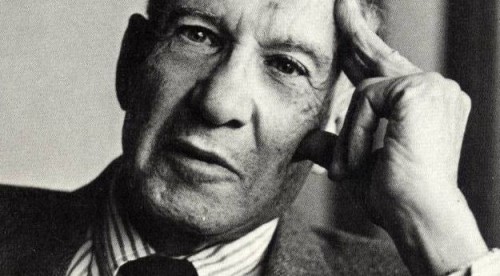In the early 1990s, Highlander Consulting was engaged by Phibro Energy to help introduce energy derivatives to Chief Financial Officers at corporations with substantial exposure to fluctuations in oil, gasoline and jet fuel prices.
As part of an integrated marketing strategy, management legend Dr. Peter F. Drucker, then serving as a professor at Claremont Graduate School, was engaged to serve as keynote speaker at the Phibro Energy Risk Management Forum, held at The Metropolitan Club in New York City.
Dr. Drucker, who passed away at age 95 in 2005, chose to speak on what he called, “The Four Roles of the CFO.” His remarks before more than 200 CFOs appear to be as relevant now as when he spoke to them nearly 25 years ago.
Here are some highlights from Peter Drucker’s presentation, which can not be found in any one of his 39 books:
The CFO as Information Officer:
“The original role of the CFO was to be the information officer of the business…Accounting, which is information, is changing today more than it has changed in the last hundred years…CFOs will have to make an important decision for their companies not very far down the line, on how to get rid of the pernicious rift between information that is concept-focused, which is accounting, and information that is transaction-focused, which is computerized information…
“The notion that you should split these two universes of information between the Chief Financial Officer, who is responsible for financial information, and the Chief Information Officer, who is responsible for non-financial information is not a good idea…
“The only reliable information we have available to us basically is “inside” information, mostly in our accounting systems. And yet, the events that really determine the success of business do not happen on the inside…So CFOs have a big job ahead: bringing together information channels, and learning an accounting system that’s going to be very different. It will require an ability to get “inside” information by manipulating figures quickly, and combining it with “outside” information, which is largely anecdotal today.”
The CFO as Financial Advisor:
“The Chief Financial Officer must think about the financial consequences of projected policies and actions, not only in terms of costs but in terms of the allocation of scarce resources…So the chief financial adviser’s job is to think about opportunity costs, and most CFOs don’t do this…As a CFO, you must think about what a policy or project is likely to return. Also think about the consequences if it doesn’t work…So the chief financial adviser basically is a conscience, a financial conscience.”
The CFO as Productivity Manager:
“There is a third CFO function, which is managing money for the business. I’m not talking of the treasury function; that is only a small part of it. The biggest part of this involves managing the productivity of capital…It’s my view that you can increase the productivity of capital in any organization three percent a year compounded, by just plain hard work, provided it’s allocated properly. And this is a function which is not, bluntly, on your professional agenda today…
“Top management doesn’t think financially. They think in terms of next quarter’s dividend, and that’s not thinking financially. They don’t think in terms of the financial impact of business decisions and the business impact of financial decisions. And that, I think, is your biggest educational job ahead.”
The CFO as Asset Protector:
“The fourth dimension of the CFO’s role is the preservation and protection of assets. This is a duty of a company that benefits not only the shareholders, but also society…The stupidest thing you can do is attempt to predict the future. Brilliant people have seen that those who predict eventually come to grief. Truly brilliant people understand that they must make external fluctuations irrelevant to their business…
“The protection of assets involves making sure that the risks over which you have no control are managed, and do not interfere with the conduct of the business. Losses based on fluctuations of commodities are no longer permissible, any more than it is permitted to have a factory burn down without insurance coverage. These are manageable risks.”
If you’d like to receive a copy of Peter Drucker’s complete remarks at the Phibro Energy Risk Management Forum in 1991, just shoot me a note.










It never ceases to amaze me how Peter Drucker was so far ahead of his time. A lot of his writing seems more relevant today than at the time when he was most active.
Thanks, Bill. What I’ve always appreciated about Drucker, beyond his timeless insights, is that he writes in a user-friendly, conversational manner…devoid of corporate jargon. He’s the Mark Twain of management science. Or more precisely, in Drucker-speak…of management as a liberal art.
Thank you for this great post. I am a fan of Drucker but have not seen any his specific thought on CFO role like this. This is very valuable advice for CFOs even today. And the most important advice, I think is CFOs must think financially i.e think in terms of the financial impact of business decisions and the business impact of financial decisions.
Thanks for taking the time to comment, Tommy. I consider myself very lucky to have met Peter Drucker, and hear him give this presentation. Gordon
Oh yes, Gordon you are very lucky. Thank you again for sharing this.
Pingback: Peter Drucker on “The Four Roles of the CFO” |Marketing Craftsmanship |CFO Totality
Pingback: Peter Drucker on “The Four Roles of the CFO” | CFO Totality
Pingback: Innovation metrics – Braineet
It´s a great post, Peter Drucker is amazing and I am a fan of his work. Thanks for sharing this. I would like a complete copy of this presentation if it´s possible.
Pingback: How to measure Innovation? Innovation Metrics for Businesses